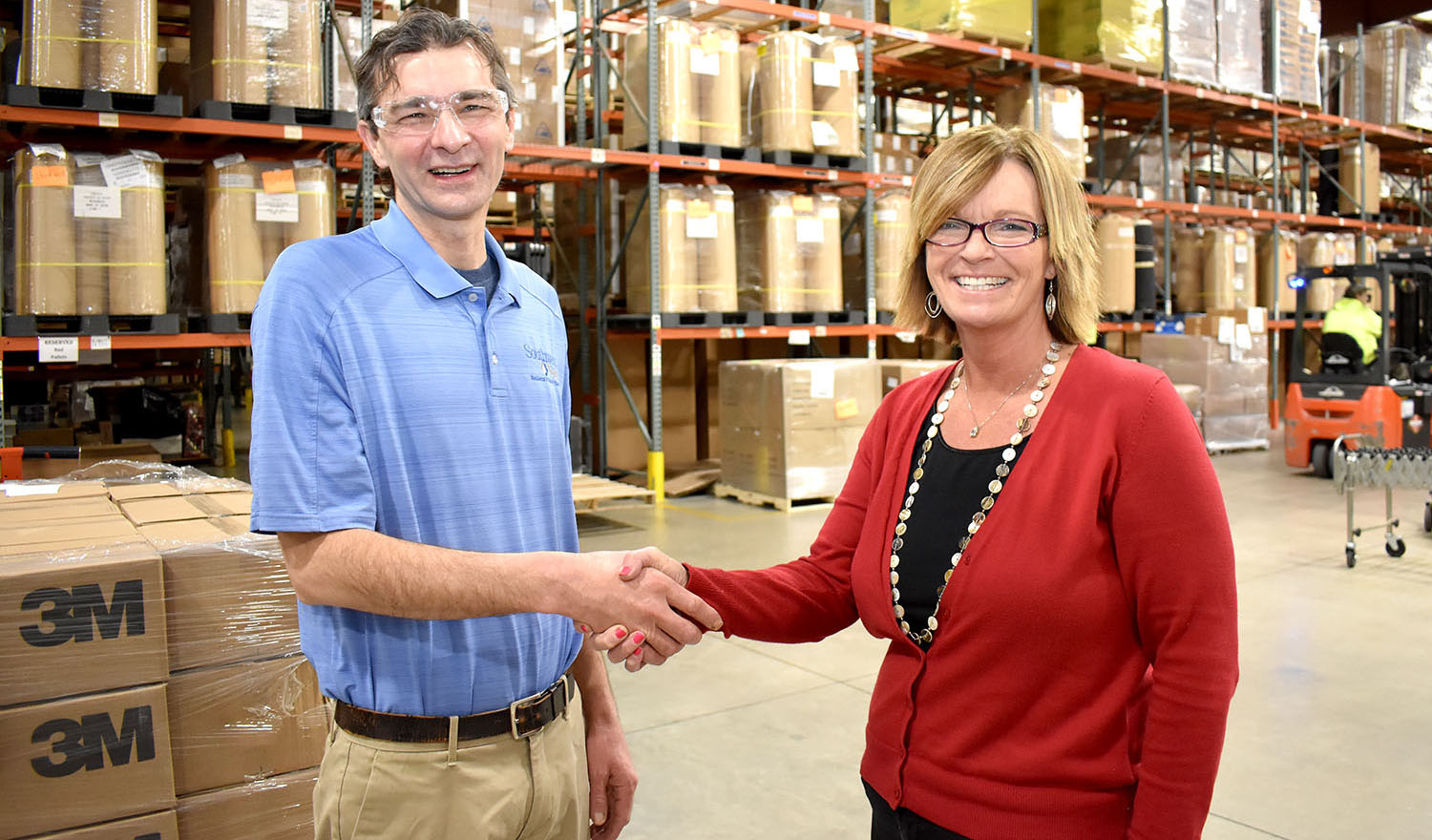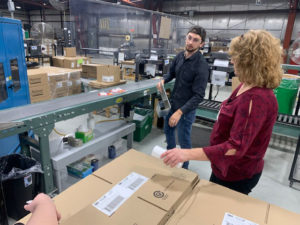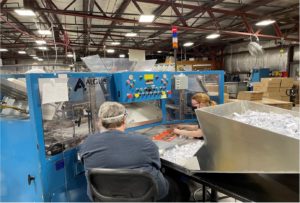For Immediate Release
Contact: Daniel Wackershauser, Marketing Specialist
Phone: 608.822.2303
Mail: 1800 Bronson Blvd., Fennimore, WI 53809
Date of Release: June 20, 2022
Truvant partnership achieves profitable results
Fennimore -
Craig Woodhouse, Regional Engagement Coordinator at Southwest Tech, is pictured with Tina Stoeffler, Vice President of Operations for the Truvant Prairie du Chien facility.
(Note: A version of this article is featured in the current edition of the Southwest Tech Annual Report.)
As a result of technical and leadership training offered through Southwest Wisconsin Technical College Business and Industry Services, Truvant, formerly Prairie Industries, in Prairie du Chien, Wisconsin, and Lansing, Iowa will be realizing $200,000 in annual operational savings. The collaboration began in Fall 2021. “As with all our clients and businesses in the district we have ongoing conversations to understand what their needs are, and that was certainly the case with Truvant,” said Craig Woodhouse, Regional Engagement Coordinator at Southwest Tech.
“This is a great example of the speed and quality at which we can assist our business partners in the district,” said Dr. Jason Wood, Southwest Tech President. “I appreciate the trust Truvant and other businesses have shown in us to assist with their needs. We value those partnerships and are excited for their future successes.”
“This was another step in letting the crews understand the ‘why’ behind it (processes) so that they feel like they are a part of it, that they are the ones driving the change and the culture,” said Tina Stoeffler, Vice President of Operations for Truvant.
A visioning session was held with Truvant leaders and Southwest Tech officials last year. “We scoped out a proposal for them and produced a unique contract specifically for them,” said Woodhouse.

The LEAN Yellow Belt Certification training went beyond the classroom and onto the production floor, where the process is being executed and value is being added. “I do as much of the training as possible out on the shop floor so that we can be in the environment where the work is done,” said Woodhouse. “It’s technical assistance and also leadership training. We were looking for specific improvements in key areas that are important to the health of the organization – safety measurements, quality reports, productivity and efficiency, and employee engagement, among others. We used their data in the training to formulate a very customized plan.”
“Our goal was to get more people to understand LEAN manufacturing, eliminating waste and creating the value-added steps,” said Brad Smock, Director of Operations for Truvant, noting very few current employees in the facilities had the training prior to this collaboration. “I think they all loved it. I think they got a lot out of it.”
“It was nice to see the team building and comradery within the group and especially with certain people who aren’t at the manager level being the speaker, the one leading the group and providing the input and seeing, not just the knowledge they had, but the animation in their face the buy-in they had,” said Stoeffler. “That alone was a huge value addition to the content matter of the training.”
The on-site training began in October and wrapped up in early January. The improved processes were embedded within the organization during that timeframe. “It’s not only important to provide the technical solution, but also the follow up to make sure that the projects that were selected for improvement are sustainable,” said Woodhouse.
“Energy is contagious,” said Stoeffler. “One feeds off the next and that’s exactly what we want to happen outside of the training.”
“It’s not just our ideas,” said Smock. “It’s ideas from their (employee’s) peers and the people they are working next to. It’s us working together as a group to figure these things out.”
Stoeffler noted they have additional ongoing projects, in conjunction with the Southwest Tech training, including automation training. “So, we want to incorporate these trainings to make us more efficient,” she said.

Attracting and keeping employees is a key component and a direct result of the program. Through the training, employees gain increased ownership in the process, which will improve engagement, leading to higher retention and less turnover. “Organizations don’t do this to reduce headcount, they do it to increase productivity,” said Woodhouse. “We want to help people develop as individuals in their workplace and in their community.”
The successful training and subsequent process improvements will benefit, not only Truvant in the long-term, but the community. “We see training like this as an important community workforce development opportunity for industries to develop their own talent,” said Woodhouse. “We want people who are in a good situation to stay in that situation for the long term.”
The training process started with Truvant leadership allowing Woodhouse to give all the employees an opportunity to step back and look at the big picture. They were able to reset and chart a new course for success. “We walked through work areas together,” he said. “We took ideas and brainstormed and developed team-based projects. We came up with technical-based solutions through an environment of teamwork.”
The results realized by Truvant are not specific to manufacturing. This tailored process-improvement training is valuable to healthcare, finance, education, government, distribution centers, and any organizations that rely on processes. “We help them find more value to their customers within those processes,” said Woodhouse. “We reduce things that do not add value, while highlighting the activities that provide value to the customer.”
Woodhouse is offering free assessments to district employers throughout 2022. He intends to have conversations with managers and supervisors, providing process improvement assessments. “This helps Southwest Tech to know what’s going on within the district and it allows me to share what I have seen as well,” he said. “We can improve the bottom line while also improving the all-around conditions. Improving the bottom line includes focusing on safety, quality and productivity. It also includes increasing employee engagement, and developing leadership skills. They don’t run counter to improving the bottom line. They actually make it possible to improve the bottom line.”
“Technical solutions can only get us so far,” added Woodhouse. “We need to understand the human behavior and we need to continuously improve.”
“We have worked with Southwest Tech through all 28 years that we have been in business,” said Stoeffler. “It has been a great partnership for us. Mentoring and training and developing our employees, which are our most valuable asset, is extremely important to us as a business and we wouldn’t be successful in that if we didn’t have the help of Southwest Tech.”
Regionally, Truvant includes 800 employees, while globally, they employ 5,600 people. Nu Pak in Boscobel, Wisconsin is also included in the Truvant ownership group.
Visioning Sessions
The visioning sessions were born out of a need recognized by the Southwest Tech District Board. “It’s a really good example of how we take feedback from our district board reps and act on it,” said Katie Glass, Executive Director of Marketing and a member of the Southwest Tech Visioning Session Team. “We were updating some of our college directions and initiatives and they asked how much input we received from businesses about how if what we are doing at the college is serving their needs and how we solicit that information. We decided we needed to do it better and more often and with those who aren’t necessarily connected with the college.”
During an executive team retreat in June 2021, Southwest Tech officials discussed the importance of the visioning sessions as a way to influence the college’s five-year strategic plan, 10-year master facilities plan and to set the stage for fundraising priorities. The listening sessions will also guide the academic master plan, identify potential contract training opportunities for Southwest Tech Business and Industry Services, inform and guide grant writing activities, enhance new student recruitment and inform and guide an assessment of the college’s Core Abilities.
The listening sessions, which numbered more than 30, consisted of in-person interviews in August and September 2021 with leaders from large and small businesses through the college’s five-county district. College leaders also had meetings with K-12 officials in the district, to help determine how they operate as a business. “We are grateful for the productive feedback we received from all our business partners throughout the district,” said Glass.
The overriding goals of the sessions were to find the best ways the college and businesses can partner to keep economic health and growth viable, including employment, housing, retention and all the issues Southwest Wisconsin is facing. “How can we work together to determine creative and innovative solutions that will set the stage for the next 5 to 10 years?” said Glass. “We want to be proactive.”
During the sessions, business leaders were asked:
- General company questions
- About workforce development (information about employees)
- About community and corporate culture
- About future projections and trends
Data from the visits is being compiled for trend and theme analysis. Initial findings were presented to the Southwest Tech District Board, Real Estate Foundation and the Southwest Tech Foundation in October 2021.
Among the preliminary discussion points from the listening sessions was the impact from the COVID-19 pandemic. Specifically, how do businesses balance the need for remote and flexible schedules versus in-person, hands-on work? On the college side, “how do we prepare our students for a work environment that is shifting and that is going through a pandemic?” said Glass. “Specific job skills are changing rapidly.”
Both employers and employees are becoming more invested in the culture of an organization, as well. The value of culture for competitive recruiting is gaining importance. “Employers are looking for someone who will fit their values and students are looking for employers with values that align with theirs,” said Glass. “That has become very important in both situations.”
According to Glass, employers also reported not knowing how to recruit and incorporate diversity, equity and inclusion initiatives, but they expressed interest in this as a viable option in attracting and retaining employees.
Leadership as an entry-level job requirement was another important topic of discussion. With the rapid retirement of employees, new graduates aren’t necessarily being employed in entry-level jobs. They are required in more leadership-type roles.
These sessions build on the efforts of all the program advisory boards throughout the college. “They are a tremendous resource for the college,” said Glass.
- To connect with Woodhouse for a process improvement assessment, call 608.822.2371 or email bis@swtc.edu. More information can be found at swtc.edu/BIS.
| Southwest Wisconsin Technical College, a finalist for the 2023 Aspen Prize for Community College Excellence, is one of 16 institutions that comprise the Wisconsin Technical College System. Southwest Tech offers more than 60 programs in a wide variety of disciplines. Courses are offered on campus, online, HyFlex and in a blended format. The college provides apprenticeship, certificate, technical diploma, and associate degree programs that respond to district workforce needs and prepare student for family-sustaining jobs and career advancement. |
